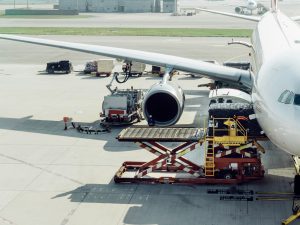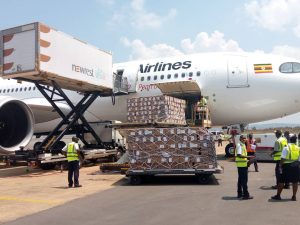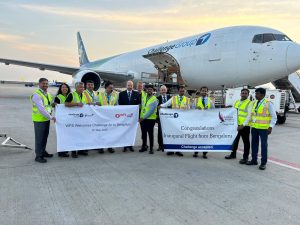Air cargo freight rate improvements continued to narrow in April amid weakening demand, geopolitical tariff tensions and a drop in jet fuel prices. While global air cargo volumes grew 4% year on year in April, global air cargo spot rates rose just 3% year on year, a second consecutive month of only a single-digit increase, said Xeneta, and a continuation of a narrowing of the growth rate. Rates were up 17% in January, 10% in February and 6% in March. “This slowdown aligns with weaker demand trends. Adding to the downward pressure on rates, jet fuel prices fell -24% year-on-year in the first three weeks of April,” said Xeneta. “This drop, driven by ongoing economic and geopolitical uncertainties, likely played a role in tempering overall spot rate growth.”
Read More »Konkan mangoes exported via cargo hub at MOPA
The Air Cargo Logistics Hub at Manohar International Airport (MOPA) has started export of mangoes from Konkan region. As per reports, a shipment containing 3386 kg of Alphonso mangoes was sent to Sharjah via Air Arabia flight. 600 kgs of mangoes are expected to be exported at Europe and UAE in the coming months.
Read More »Vietnam Airlines, Challenge Group begin freighters from BLR Airport
Giving a boost to Indian air cargo, and trusting its in capabilities, both Vietnam Airlines and Challenge Group have started their cargo operations recently from Bangalore Airport, with Worldwide Flight Services (WFS) and AISATS as their cargo handling and ground handling partners respectively. Vietnam Airlines will operate four weekly flights from BLR Airport to Hanoi International Airport, while Challenge Group will operate one weekly freighter services from BLR Airport.
Read More »‘Responsible sourcing, minimised environmental impact & supporting local communities will drive growth’
Smitha Shetty –Regional Director APAC– Achilles Information said, “Industries are prioritising innovation in extraction, processing and recycling technologies. Crucially, the focus is shifting towards sustainable practices and ESG considerations. This includes responsible sourcing, minimising environmental impact and supporting local communities. The long-term growth of the commodities sector will depend on our collective ability to balance economic development with environmental stewardship and social responsibility.”
Read More »‘Govt, industry must invest in R&D to ensure long-term sustainable growth’
Kavitha Suresh, AGM – Crown Workspace & Warehousing, said, “Governments and industries focus on the 4 ‘I’s – Information, Insight, Influence, and Impact – before making investments is crucial. They are investing in R&D to ensure long-term sustainable growth and improve infrastructure for smooth business operations. Long-term joint ventures are formed to secure stable investments and fuel growth. Additionally, training programs are pivotal for organisational growth, ensuring a skilled workforce. Investment in technology is crucial for long-term growth. Regulatory support, which encourages sustainable practices, investment in green technologies, and provides tax incentives and subsidies, also plays a significant role in ensuring long-term growth.”
Read More »‘Increasing pressure on air cargo to adopt SAF, but it’s still developing & costly’
Malcolm D’souza, Director Airfreight and Member of the Management Board, Jeena & Company said, “There is increasing pressure on the air cargo sector to meet stricter environmental standards, especially as governments adopt more stringent emission reduction targets. Air cargo companies are under pressure to reduce their carbon footprint, which may involve investing in cleaner technologies like sustainable aviation fuel (SAF), but these technologies are still developing and costly to implement. Although some segments of the air cargo industry have adopted digital technologies, many areas remain outdated. For example, paper-based documentation, manual data entry, and lack of integration across platforms still slow down operations. Automation, predictive analytics and blockchain solutions could streamline operations, but not all players are on the cutting edge of adopting these technologies.”
Read More »‘72%0 companies are prioritising energy efficiency to decarbonise ops & reduce costs’
Glyn Hughes, Director General TIACA said, “Globally, 72 per cent of companies are prioritising energy efficiency to decarbonise operations and reduce costs. Fleet modernisation, digitalisation and innovation are key focus areas, with 84 per cent actively investing in digital solutions and 83 per cent in innovation-driven sustainability measures. Good to see the industry’s commitment to improving the impact TIAC has on people, the planet and global prosperity. We also encourage everyone to consider undertaking the BlueSky assessment which would provide them a personalised organisational dashboard of their sustainability progress.”
Read More »‘FIATA has been instrumental in cargo growth’
Keshav Tanna, Founder Director, at Links Forwarders said, “FIATA has been instrumental in developing some very important transport documents like the FIATA Forwarders Certificate of Receipt(FCR); the FIATA Bill of Lading (FBL); the FIATA Certificate of Transport (FCT): the FIATA warehouse receipt (FWR) and so on; all these assist the Forwarders to transact globally in a standardised manner ensuring efficiency by adopting best practises. A very important aspect of FIATA’s activities for the benefit of its’ members is the FIATA Logistics Institutes that imparts training through FIATA Diploma courses in freight forwarding, thereby preparing the next gen to professionally conduct their business in the field of logistics. Amongst FIATA’s important global events the most spectacular one is the annual FIATA Congress which witnesses the Globe unite at one single event mixing business, pleasure, culture and show case the diversity this truly global organisation called FIATA. FIATA Regional Meetings are designed to essentially have large participation from the Region – in this case the Region Asia Pacific. We shall witness members from various Asia Pacific Countries participate and address regional challenge and exploring solutions thereof; also there would be huge opportunities for networking in terms of B2B meetings and also sharing industry insights. We also expect active participation from various authorities like CBIC; Airport Operators; dignitaries from Civil Aviation and our colleagues from the Airlines. The buzz word being “interaction.”
Read More »Attics Logistics orders 100 delivery drones to transform logistics
Sitics Logistics has placed an order for 100 autonomous BVLOS (Beyond Visual Line of Sight) delivery drones from TECHEAGLE Innovations. The deal is among the largest commercial drone logistics agreements globally and underscores a shared vision to build a faster, more sustainable, and tech-enabled delivery ecosystem across the country. The collaboration is designed to address inefficiencies in traditional last-mile and mid-mile logistics. TECHEAGLE’s in-house developed drones will support Sitics’ operations across e-commerce, intercity B2B, and direct-to-consumer deliveries. The initial rollout will begin in Delhi-NCR, Mumbai-Pune, and Bengaluru, with plans to scale to over ten cities in the coming months. With this deployment, the two companies are working to build a hybrid logistics network that combines aerial and ground-based systems to deliver increased efficiency and environmental sustainability.
Read More »Kuehne+Nagel partners with cargo.one to enhance digital bookings
Kuehne+Nagel (K+N) has linked its systems with cargo.one to expand the number of airlines its team can access digitally. The partnership sees K+N integrate cargo.one’s Offer & Book API Suite into its own systems to gain access to the space offered by the airlines and general sales agents that place their capacity on the booking portal.
Read More » Cargo Breaking News
Cargo Breaking News









